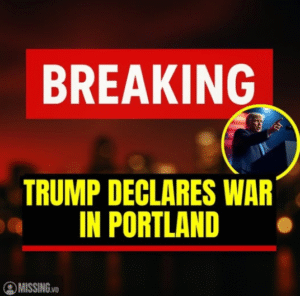“A War at Home”: Trump’s Portland Threat and the Battle Over American Cities
On September 5, 2025, President Donald Trump stood in the Oval Office and made a statement that reverberated across the country: Portland, Oregon, he declared, was “like living in hell,” and he hinted that the city could be next in line for National Guard deployment. Though he stopped short of confirming a military operation, his words—“we’ll wipe ’em out”—left little ambiguity about his intent.
This wasn’t the first time Trump had threatened federal action against Democratic-led cities. Chicago, Washington D.C., and Los Angeles had already seen National Guard troops deployed under his administration’s sweeping law enforcement initiative. But Portland, with its long history of protest and resistance, struck a deeper chord. For many, the president’s rhetoric felt less like policy and more like a declaration of war—not against a foreign adversary, but against fellow Americans.
The Language of War
Trump’s framing was stark. He referred to protesters as “paid terrorists,” accused radical left groups of orchestrating chaos, and described Portland as a city “ruined” by lawlessness. He even invoked imagery from the Vietnam War film Apocalypse Now, echoing the infamous line, “I love the smell of napalm in the morning,” with his own twist: “I love the smell of deportations in the morning”.
This wasn’t just political theater—it was a deliberate shift in tone. On the same day, Trump signed an executive order renaming the Department of Defense as the “Department of War,” a symbolic gesture meant to project strength and resolve. Though the change lacks legal authority, it signals a broader rebranding of federal power: one that prioritizes domination over diplomacy.
Portland’s Legacy of Resistance
Portland has long been a flashpoint for civil unrest, particularly around issues of immigration, police brutality, and federal overreach. The city’s protests against U.S. Immigration and Customs Enforcement (ICE) have drawn national attention, with demonstrators camping outside federal buildings, clashing with law enforcement, and demanding systemic change.
For residents, Trump’s threat felt both familiar and surreal. Many recalled the summer of 2020, when federal agents in unmarked vans detained protesters during the George Floyd demonstrations. That episode, widely condemned as unconstitutional, left deep scars in the city’s collective memory. Now, five years later, the specter of federal intervention looms again—this time with the president openly embracing the language of war.
A City Responds
Portland Mayor Keith Wilson swiftly rejected the need for federal troops, stating that the city does not require outside intervention. Oregon’s Attorney General threatened legal action if Trump follows through on his plans. Civil rights groups, local leaders, and community organizers echoed the sentiment: Portland’s challenges require compassion and collaboration, not militarization.
Yet beneath the political pushback lies a deeper emotional current. For many Portlanders, the president’s words felt like an attack on their identity—a city known for its activism, its eccentricity, and its fierce independence. To be labeled a war zone by the Commander-in-Chief is not just inflammatory; it’s deeply personal.
The National Implications
Trump’s threats against Portland are part of a broader pattern. His administration has increasingly targeted sanctuary cities—jurisdictions that limit cooperation with federal immigration enforcement—as symbols of defiance. Chicago, New York, and New Orleans have all been named as potential sites for expanded ICE operations and National Guard deployments.
Critics argue that this strategy is less about public safety and more about political theater. By painting Democratic-led cities as lawless and dangerous, Trump reinforces a narrative that justifies authoritarian measures. Supporters, meanwhile, see it as a necessary crackdown on crime and disorder.
But the stakes go beyond partisan politics. When a sitting president threatens to “wipe out” American citizens, it raises profound questions about the limits of executive power, the role of federal forces in domestic affairs, and the meaning of democracy itself.
The Emotional Toll
For those who live in Portland—and cities like it—the emotional toll is immense. To be cast as enemies of the state, to see your home described as “hell,” is to feel abandoned by the very institutions meant to protect you. It’s a rupture not just of policy, but of trust.
And yet, amid the fear and uncertainty, there is resilience. Protesters continue to gather, not in defiance of law, but in defense of dignity. Community leaders organize teach-ins, legal aid, and mutual support networks. Artists paint murals of resistance. Families march with their children. The city, far from crumbling, is holding itself together with courage and care.
A Nation at a Crossroads
Trump’s declaration—whether rhetorical or literal—marks a turning point. It forces Americans to confront uncomfortable truths about power, protest, and patriotism. What does it mean when the president threatens war against his own people? How do we reconcile national security with civil liberties? And who gets to decide what constitutes “order”?
These are not abstract questions. They are lived realities for millions of Americans who find themselves caught between federal authority and local autonomy. They are questions that demand not just legal answers, but moral ones.
Conclusion: The Battle for America’s Soul
In the end, the story of Portland is not just about one city. It is about the soul of a nation grappling with its identity. Are we a country that silences dissent with force, or one that listens and learns? Do we respond to protest with punishment, or with policy?
Trump’s threats may dominate headlines, but they cannot


